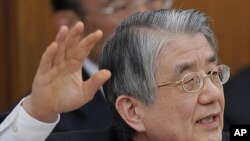Japan's atomic safety chief told a government panel Wednesday that the country's nuclear safety regulations are outdated and do not meet global standards. He also apologized for their failure to avert disaster last year, when a massive earthquake and tsunami wrecked a nuclear power plant and contaminated a wide area of northeastern Japan.
Nuclear chief Haruki Madarame said safety guidelines, which are non-binding for utilities, did not include tsunami countermeasures. He also said utility engineers at the Fukushima-Daiichi power plant never seriously considered ahead of the disaster the damage that could be caused by extended electricity outages.
Those outages and the failure of backup generators at the plant disabled reactor cooling systems and led to meltdowns in three of the plant's six reactors on March 11.
Madarame said "we ended up wasting our time finding excuses" and explaining why Japan did not need to take such safety precautions.
The Fukushima disaster forced a major reorganization of the country's nuclear regulatory and safety agencies.
Following the meltdowns, the former president of the Tokyo Electric Power Company (TEPCO), Masataka Shimzu, made several public apologies for failing to contain the disaster. He also apologized for keeping a low public profile as public anger with the government spread in the days and weeks after the disaster.
Some information for this report was provided by AP, AFP and Reuters.




